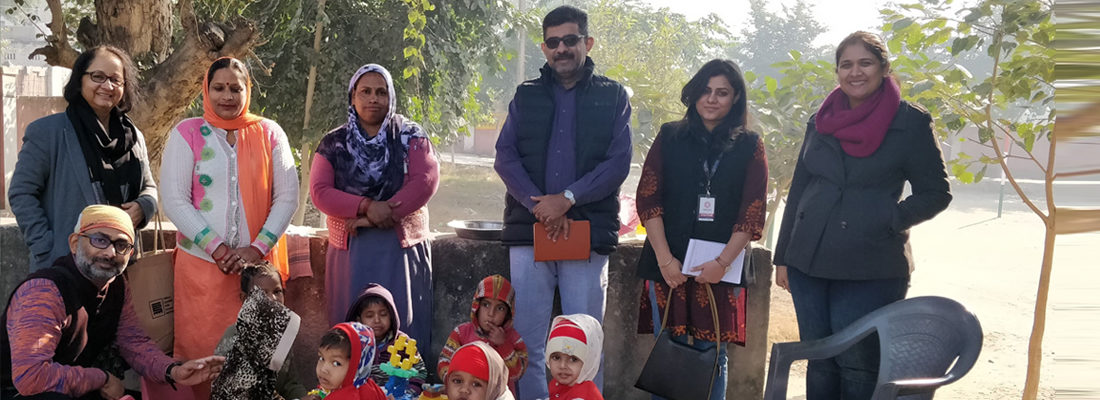


Date : Jan 15 , 2019 | Alumni
Chandru Chawla writes about the eye-opening nine days he spent as a part of the December 2018 cohort of the ILSS Leadership Program.
When someone convinces you in a booming voice that “used clothes” can be used as a currency to get village folks to help themselves, you know you are in for a rough ride. When that person is Anshu Gupta, you find yourself riding a tiger – getting off will be fatal!
As Gupta traces the journey of Goonj, laying himself bare, he challenges you to confront your worst fears and beliefs. When he is talking to us, he is pleading that this can’t be his battle alone. He is cajoling us to jump in: every minute must make a difference to someone’s life, somewhere.
Economics is about the triumph of opportunity over scarcity, says Dr Kenwyn Smith to a group comprising many corporate folks, and quickly adds that Nature is all about abundance as it gives endlessly. He questions a disbelieving corporate set on its beliefs about leadership and defines authentic acts of leadership that lead to sustainable transformation: acts that have a multiplier effect, where the positives far outweigh the negatives and positively impact the most vulnerable. Images of Mahatma Gandhi flash in our minds – can he still be relevant today?
Fast forward to a mesmerising journey that takes you from Pretoria in the early 1900s to colonial India. Prof Rudrangshu Mukherjee outlines the teaching of Mahatma Gandhi in his most defining political essay “Hind Swaraj” – the principles of simplicity (daridra), fearlessness (abhaya), non-violence (ahimsa), unwavering commitment to Truth (satya) and communal harmony; these are the five pillars on which New India must be built. He challenges us to consider replacing desire and greed with interdependence and reciprocity – the values of simple village living – to lead a life of ‘enlightened anarchy’ or true Ramrajaya. In an era where ‘toxic’, ‘trauma’ and ‘rage’ are the top three words of discourse, Gandhi’s principles ring modern and contemporary, as if he were still among us.
Anshu Gupta and Prof Mukherjee were the two bookends of a journey thoughtfully and lovingly designed to help the travellers to introspect and explore their inner selves and find a new purpose to their lives. Some came looking to cross over from “materially meaningful careers” to “careers with purpose”, and some, like me, to rediscover innocence, simplicity and compassion
The ILSS Leadership Program was not for the faint hearted. Indeed, it tested one’s resolve to hear, often painful, truths of lives of the under-privileged and the triumph of the human spirit. Shaheen Mistri of Teach for India, encouraged us to reimagine education as a space where love, happiness and compassion are the most important values. The motive of Life is to give endlessly, she said. Osama Manzar of DEF showed how empowerment through digital can be taken to its next level. Urvashi Butalia brought fresh perspective how we saw the feminist struggle and the endless daily battles for gender equality.
Natasha Zarine of EcoSattva demonstrated how social purpose and commerce can intersect through a variety of initiatives, from waste disposal to water treatment to afforestation. Archana Chandra’s committed journey at Jai Vakeel Foundation brought a lump in our throats. Sujata Khandekar’s journey from improving adult literacy in low-income communities to empowerment of grassroots women was inspiring. Srikanth Viswanath of Janaagraha had a simple message for us: that civic awareness and participation through every day acts of civic leadership is the truest way to preserve our democracy. Prabhat Kumar inspired us with his story of how a young entrepreneur went back to his farming roots to find opportunity in adversity and motivated his community to change course – a real example of how farm distress can be buttressed!
The ILSS caravan explores the complete canvas of the social sector – from policy
making to policy implementation, from social initiatives across gender,
farming, education, adult literacy, health and sanitation to impact investing.
There is something to engage everyone. It’s not all class room sessions – the
field trip with visits to anganwadis, government primary schools, village panchayats
and a government service centre open our eyes to the world of possibilities.
I have come back from this program, with eyes wide open, a will to explore a life of purpose, a bunch of lifelong friends and a network of passionate people who are changing people’s lives, minute by minute. This is an amazing nine-day journey, truly transformative!
Take a look at all the speakers who addressed the participants in the December batch of the ILSS Leadership Program.
Date : Jul 4 , 2024
Date : Jun 27 , 2024
Date : Jun 15 , 2024
Date : Apr 5 , 2024
Date : Mar 28 , 2024
Date : Jan 25 , 2024
Date : Mar 22 , 2023
Date : Mar 15 , 2022